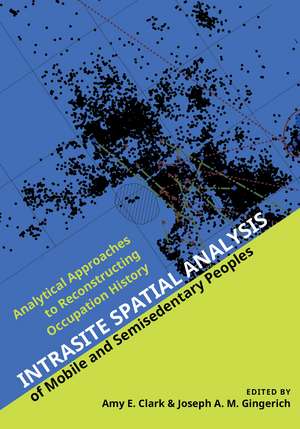Intrasite Spatial Analysis of Mobile and Semisedentary Peoples: Analytical Approaches to Reconstructing Occupation History
Editat de Amy E. Clark, Joseph A. M. Gingerichen Limba Engleză Hardback – 17 iun 2022
This volume includes studies that span archaeological and ethnographic contexts, from highly mobile Paleoindian foragers to semi-sedentary preagriculturalists of the Epipaleolithic and modern pastoralists in Mongolia. The authors hold that commonalities in human behavior lead to similar patterns in the organization and maintenance of space by people. They present a series of ideas and approaches to make it easier to recognize universals in human behaviors, which allow archaeologists to better compare intrasite spatial patterns. The book creates a baseline for new intrasite spatial analyses in the twenty-first century.
Preț: 477.19 lei
Preț vechi: 561.40 lei
-15% Nou
Puncte Express: 716
Preț estimativ în valută:
91.31€ • 95.58$ • 75.100£
91.31€ • 95.58$ • 75.100£
Carte indisponibilă temporar
Doresc să fiu notificat când acest titlu va fi disponibil:
Se trimite...
Preluare comenzi: 021 569.72.76
Specificații
ISBN-13: 9781647690441
ISBN-10: 1647690447
Pagini: 240
Ilustrații: 52 illustrations, 4 maps
Dimensiuni: 178 x 254 x 18 mm
Greutate: 0.48 kg
Editura: University of Utah Press
Colecția University of Utah Press
ISBN-10: 1647690447
Pagini: 240
Ilustrații: 52 illustrations, 4 maps
Dimensiuni: 178 x 254 x 18 mm
Greutate: 0.48 kg
Editura: University of Utah Press
Colecția University of Utah Press
Recenzii
“Clark and Gingerich provide an excellent range of papers that deal with one of the bread-and-butter topics in archaeology, spatial analysis. Their research is well-sourced, innovative, and analytically sound. This book should be useful for archaeologists working in many different time periods and contexts and could also be useful as a companion book for hunter-gatherer or quantitative methods courses.”
—Shane Miller, associate professor, Department of Anthropology and Middle East Cultures, Mississippi State University
—Shane Miller, associate professor, Department of Anthropology and Middle East Cultures, Mississippi State University
Notă biografică
Amy E. Clark is a college fellow and lecturer at Harvard University specializing in human behavioral evolution. Her work has been published in Evolutionary Anthropology, Current Anthropology, Journal of Archaeological Method and Theory, Journal of Anthropological Archaeology, and Proceedings of the National Academy of Science.
Joseph A. M. Gingerich is associate professor of anthropology at Ohio University and a research associate at the Smithsonian’s National Museum of Natural History. His most recent work in spatial analyses has been supported by the National Science Foundation and National Geographic. He is the editor of In the Eastern Fluted Point Tradition, volumes 1 and 2.
Joseph A. M. Gingerich is associate professor of anthropology at Ohio University and a research associate at the Smithsonian’s National Museum of Natural History. His most recent work in spatial analyses has been supported by the National Science Foundation and National Geographic. He is the editor of In the Eastern Fluted Point Tradition, volumes 1 and 2.
Cuprins
List of Figures
List of Tables
Preface
1. Rethinking Intrasite Spatial Analysis
Amy E. Clark
Part I: The Role of Formation Processes and Occupation Dynamics on Site Structure
2. Assessing the Effects of Trampling on the Spatial Organization of Archaeological Assemblages Using Statistical Methods: An Ethnoarchaeological Case Study
Francesco Carrer
3. Intrasite Analysis of Repeatedly Occupied Camps: Sacrificing “Resolution” to Get the Story
Reuven Yeshurun
4. Spatial Scaling of Folsom Paleoindian Hunter-Gatherer Camps in Western North America
Briggs Buchanan and Marcus J. Hamilton
5. The Marginal Value of Hunter-Gatherer Site Structure
Brian F. Codding and David W. Zeanah
Part II: Site Use and Patterns of Discard
6. Understanding Refitting and Artifact Distributions in Spatial Context: A Paleoindian Case Study
Joseph A. M. Gingerich
7. When Window Mesh Is Worth It: Assessing the Potential of Microrefuse in Spatial Analysis of Hunter-Gatherer Sites
Brooke M. Morgan
8. Spatial Analysis in the Woodland: Foraging Behavior in Sedentary Agricultural Societies
James G. Enloe
Part III: Elucidating Social Structure from Spatial Patterning
9. The Other Invisible Sex: Division of Labor and Domestic Space in the Mongolian Taiga
Todd A. Surovell, Matthew J. O’Brien, and Randall Haas
10. Scaling Analysis of Prehistoric Wyoming Campsites: Implications for Hunter-Gatherer Social Dynamics
Scott Ortman, Laura L. Scheiber, and Zachary Cooper
11. Communal Hunting and Teasing Out Signs of Cooperation in the Past
Matthew J. O’Brien and Danny N. Walker
12. Going Forward in Intrasite Spatial Analysis: An Afterword
Amy E. Clark andJoseph A. M. Gingerich
References
Contributors
Index
